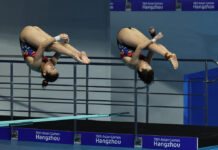
KUALA LUMPUR – It will take some time before Malaysian diving can once again compete for top honours on the international stage.
Following the recent Sukma Games in Sarawak, national diving technical director Bryan Nickson Lomas told Scoop that only a few divers from the states have been identified as potential candidates for the national backup programme.
According to Bryan, who was scouting alongside two other national backup coaches, there remains a significant gap in quality and consistency between male and female athletes.
“The standard for male athletes at Sukma isn’t too bad. However, they have yet to reach technical maturity, as they are still in the process of increasing their diving difficulty (DD),” said Bryan, who was a key figure during the golden era of Malaysian diving under former head coach Yang Zhuliang from China.
“Some of them have reached a level that allows them to compete internationally, but they need to improve their consistency and DD. A few have even surpassed the Minimum Qualification Score (MQS), which indicates a certain level of competence.”
However, Bryan was less optimistic about the young female divers.
“Our female athletes are still below par, especially when we consider international standards.
“At Sukma, only the 10 m synchro event met the minimum MQS. Other events came close but fell short by about 10 points. The female athletes are still working on completing their full set of dives.
“For instance, Lee Yiat Qing (Federal Territories) and Nur Farisya Alia Affendi (Sarawak) have yet to develop a complete set for the 10m event.
“The same goes for the women’s 3m springboard event. The performance and scores of our female athletes are not yet sufficient to be contenders at the international level, such as the Sea Games.
“They are working hard to close the gap between the women’s standard in the National Podium Programme and the national backup squad.”
Bryan, who only assumed the role of technical director late last year, outlined some plans moving forward.
His immediate focus is on improving the standard of divers in the national backup programme to ensure there are more new faces representing Malaysia at the Sea Games next year and the World Championships.
“This year, we will be hosting the very first national trials in September, giving both the backup and podium divers a fair chance to qualify for the World Championships next year,” Bryan explained.
“Under Malaysia Swimming’s (MS) requirements, the divers must clear at least two out of three competitions to make the cut.
“My immediate plan is to first improve our backup divers by exposing them to as many tournaments as possible. For the states, we need a much more robust programme.
“We are looking into bringing in more foreign coaches to elevate the quality of our divers at the grassroots level,” added Bryan.
Host Sarawak, with a strong foundation in diving, unsurprisingly topped the medal haul, winning nine gold medals out of the 12 available.
This was their biggest haul in the history of the Games. They also secured three silver and two bronze medals.
The Federal Territories came in second with three gold, four silver, and four bronze medals.
Terengganu, which garnered attention for sending Muslim female divers to the Games, finished third with two silver and three bronze medals. – August 29, 2024



